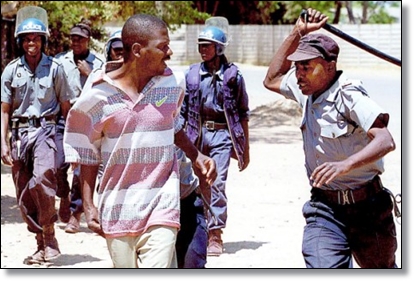Zimbabwe: Victim of Low Self Esteem?

 |
| Zimbabwe police engage a demonstrator P.Courtesy |
Self esteem is a means by which we judge ourselves. It also affects how we judge and relate to others. It is represented in our need for respect from others, our need to respect ourselves and how we assess our personal value. Qualities we associate with low self-esteem include aggression, hypersensitivity, defensiveness, poor judgement, denial, hypervigilence and abusive behaviour.
While people with low self esteem aren’t always aware of the problem, and may deny that it exists, other people are able to see it manifest in their behavior and attitude towards others.
The arrest and detention of human rights lawyer, Beatrice Mtetwa tells its own story about the relationship between bullying behaviour and low self esteem. Someone with a healthy self concept is unlikely to bully others or react in an unreasonable way towards harmless actions and enquiries.
The poor self image of Zimbabwe is not restricted to institutional actions and attitudes. It cascades all the way down to regular citizens and how they view one another. Waiting at the traffic lights the other day, I was handed a flyer advertising the Steve Margolis Resort. It was attractive and the name had a certain ring to it. I wondered though, how much impact on public perception it would have if the resort was called, say, the Tafadzwa Mashonganyika Resort. Even if the pictures were the same, would we still think of it as an attractive holiday proposition?
The fact that we still shun that which is clearly local and homegrown is a manifestation of the low regard we have for ourselves and one another. We prefer to use firms with English sounding names rather than vernacular ones and we associate Western or “white” tastes and ideas with superior quality. In what other country would a Shona-speaking mother and a Shona-speaking father produce an English-speaking child? Where does this low self image come from? Is it a result of being disappointed one too many times by some of our own? Is it a product of our early experiences which inform our foundational beliefs about ourselves?
We look to our leaders to steer us out of a quagmire of high expectations for our future against a past that continues to haunt us. The ghosts of colonization, gukurahundi, murambatsvina and electoral violence have not been laid, and will continue to erupt in the narrative of our nation as long as we don’t confront and resolve them. We have made the process of national healing and reconciliation laughable because we rendered the body tasked with that process impotent and the exercise redundant.
Our leaders have presented us with instruments of bullying which do not move us closer to a healthier self esteem. Acts such as AIPPA, and the Official Secrets Act do not help us address the deep seated hurts that plague us. While seeming to right the wrongs of the past, the indigenisation and land reform processes have presented us with as many questions as answers, deepened racial divisions among us and allowed the culture of bullying to prevail.
Low self esteem also becomes evident in the way we manage relationships with others. The partners we choose to get into bed with and how we speak of our enemies is indicative of the value we set upon ourselves and others. The national dialogue is Zimbabwe has been filled with juvenile barbs and hate speech, products of a defensive and unhealthy self image.
Perhaps it is time for us to come to terms with our collective personality disorder; to address the causes thereof, and to move forward with a commitment to gifting the next generation with a country where mutual respect prevails, where tolerance triumphs over tyranny and where national pride is the order of the day.
By Thembe Khumalo (Ms)
Harare, Zimbabwe.
Email: khumalothembe@gmail.com
